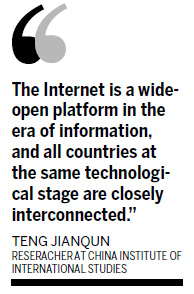Asia
Experts say cooperation needed to counter cyber threats
Updated: 2011-08-08 06:56
By Qin Zhongwei and Cui Haipei (China Daily)
BEIJING - The international community should join hands to deal with growing threats to computer security, as attacks by hackers have become a worldwide concern, Chinese security experts suggested.
A recently released US report highlighted an unprecedented series of cyber attacks on more than 72 organizations worldwide, including the United Nations, the International Olympic Committee, governments, corporations and non-profit organizations.
"This is the biggest transfer of wealth in terms of intellectual property in human history," said Dmitri Alperovitch, vice-president of threat research at US security company McAfee Inc, which produced and released the 14-page report on Wednesday.
In the case of the UN, the hackers broke into the computer system of its secretariat in Geneva in 2008, hid there for nearly two years and quietly combed through reams of confidential information, according to McAfee.
"Even we were surprised by the enormous diversity of the victim organizations and were taken aback by the audacity of the perpetrators," the report said.
In light of McAfee's latest alarming report, countries should work together to counter criminal behavior, Chinese experts said.
"The Internet is a wide-open platform in the era of information, and all countries at the same technological stage are closely interconnected," Teng Jianqun, a researcher for computer security at China Institute of International Studies, told China Daily.
McAfee's report stated a "state actor" was behind the attacks but did not provide further details. Some experts believe that the evidence points to China or Russia.
Jim Lewis, a computer security expert at the Center for Strategic and International Studies, claimed it was very likely China was behind the campaign because some of the targets had information that would be of particular interest to Beijing, according to Reuters.

But Chinese experts believe it is inappropriate to jump to conclusions since the hackers' origin is still unknown, Teng said.
Hackers usually launch attacks by controlling other computers, making it very difficult to locate the source of the attacks, said Wen Weiping, an associate professor at the Department of Information Security at Peking University.
"Overseas hackers, for example, could first attack a computer in China and then use the Chinese computer to attack other countries, making their victims believe they were being attacked from China," he told China Daily.
Teng said hackers are a global threat. Since they are dispersed throughout the world, it is necessary for the international community to cooperate to deal with the issue, he said.
China is also one of the leading targets of cyber attacks, according to the China National Computer Network Emergency Response Technical Team (CNCERT).
Last year, 4.5 million computers in China were attacked from nearly 220,000 overseas locations, according to CNCERT.
"We should begin with cooperation in areas of mutual interest, such as counter-terrorism in cyber space. Only through determined cooperation can we win the war against hackers to secure the Internet," Wen added.
E-paper

My Chinese Valentine
Local businesses are cashing in on a traditional love story involving a cow herder and a goddess
Outdoor success
Lifting the veil
Allure of mystery
Specials

Sowing the seeds of doubt
The presence in China of multinationals such as Monsanto and Pioneer is sparking controversy

Lifting the veil
Beijing's Palace Museum, also known as the Forbidden City, is steeped in history, dreams and tears, which are perfectly reflected in design.

Beer we go
Early numbers not so robust for Beijing's first international beer festival
